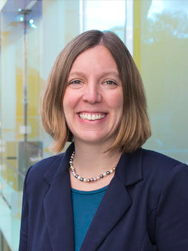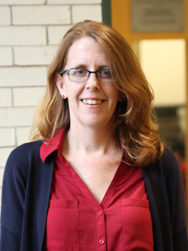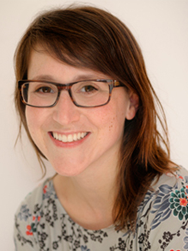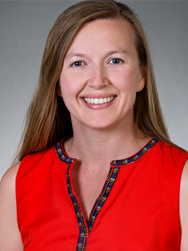2018-2019 Wimmer Faculty Fellows
We are pleased to announce the 2018-2019 Wimmer Faculty Fellows. These fellowships are made possible by a grant from the Wimmer Family Foundation and are designed for junior faculty members interested in enhancing their teaching through concentrated work designing or re-designing a course, innovating new materials, or exploring a new pedagogical approach. Fellows work in close collaboration with Eberly Center colleagues and receive a stipend to acknowledge the work it takes to improve one's effectiveness as an educator.
 |
Rosalyn AbbottAssistant Professor |
As its title indicates, Professor Abbott’s Introduction to Biomedical Engineering course is designed to introduce students to biomedical engineering (BME). She aims to provide her students with sufficient information to determine whether or not BME is the right career choice for them. Doing so requires getting students to experience the kinds of research that they will be expected to consume and conduct. Professor Abbott accomplished this goal by implementing active learning strategies that required students to perform virtual cell culture experiments using an online game. Students then used their knowledge of the experimentation process to design a plasmid. Having taught this course before, Professor Abbott was able to compare how students performed on course assessments when they learned the material via lecture (as in previous semesters) versus active learning (Fall 2018). Students scored significantly higher on course assessments when they learned the material via active learning.
 |
Robin MeijiaVisiting Faculty |
Professor Mejia reworked the lectures and labs in her Sampling, Survey, and Society course to create opportunities for scaffolded active learning. For their final project, students must analyze a complex data set, so Professor Mejia built in opportunities for them to practice doing this throughout the semester using a real, complex data set. These smaller activities and assignments allowed students to receive practice and feedback on this skill before they started work on their final project. Professor Mejia reports, “Having them analyze complex survey data during the semester enabled them to take on more challenging analyses for their final projects.” Additionally, the quality of the final projects improved as a result of this change.
 |
Daphne PetersAssistant Teaching Professor |
Professor Peters redesigned her course entitled Prototype Lab 1: Environments to give students a better understanding of the learning goals of the course as well as a better sense of the broader Environments field. To accomplish this redesign, Professor Peters developed rubrics for each of the course projects that highlighted the connections between the projects and the overall learning goals of the course. Throughout the course, students were prompted to write reflections on their learning in relationship to the criteria provided in these rubrics (e.g., how confident does the student feel in their ability to complete a particular design task). Additionally, so as to gain a better sense of the field, Professor Peters incorporated examples of real-world Environments projects that related to course content. In post-course surveys, students reported feeling more confident in their grasp of the skills taught in the course as well as a better understanding of the learning goals. Students also reported having a better sense of the Environments field as a whole.
 |
Rebecca TaylorAssistant Professor |
Professor Taylor implemented pre-class quizzes in her Engineering Design 1: Methods and Skills course to provide herself and her students with feedback about student learning. Students took these quizzes after completing assigned readings and in-preparation for in-class activities. The quizzes allowed students and Professor Taylor to see what concepts the students had successfully learned as well as what concepts they needed additional practice with. Professor Taylor could then target these “knowledge gaps” during class, rather than spending time covering material that the students had already learned. Professor Taylor reports that her students “recognized the benefit of the pre-quizzes requiring accountability” and actually requested more quizzes for other modules in the course.
To see Rebecca present her Wimmer project at CMU’s Annual Teaching & Learning Summit, click here.
 |
Zachary UlissiAssistant Professor |
To better help with the programming on-boarding for first-semester chemical engineering Master’s students, Professor Ulissi worked with the Eberly Center to build and implement an online training module that students completed during the first few weeks of the course. Student work in the module was supplemented by in-class programming exercises where students were allowed to test their knowledge of their module. The majority of students (75%) reported that the online module was helpful and that it significantly reduced the amount of time they spent outside of class learning to program. Professor Ulissi plans to continue using the online training module in future iterations of the course.